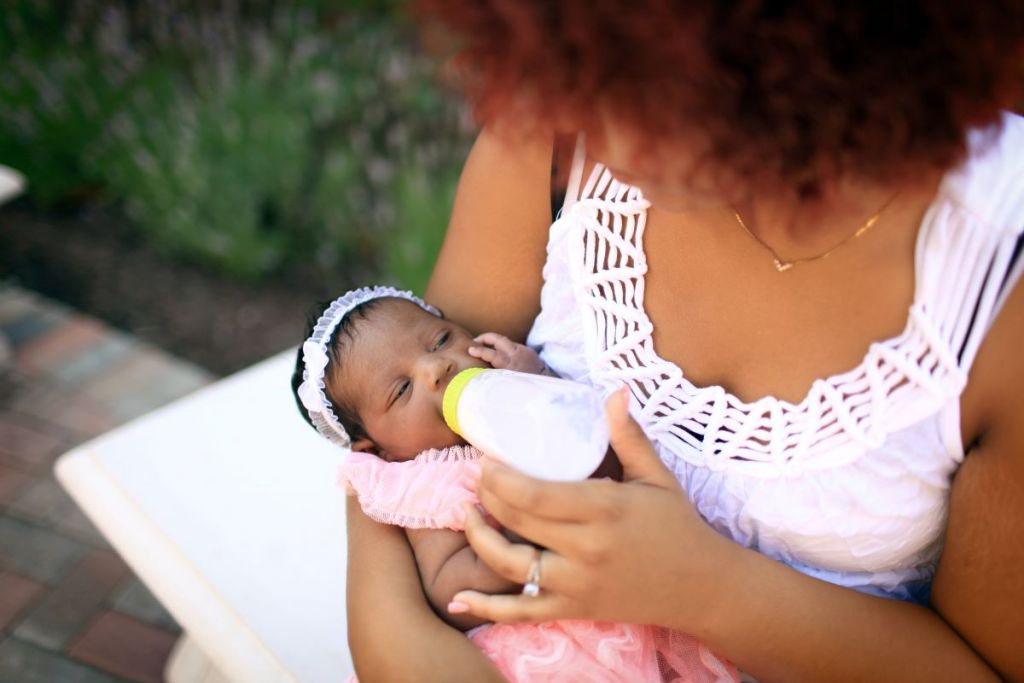
Bringing baby home from the hospital comes with a laundry list of new responsibilities and questions. Besides the sleep schedule, many new parents may be worried about whether their infant is getting enough to eat. But, is going the other direction something parents should also worry about? Is there such a thing as overfeeding a newborn? The short answer is yes. Overfeeding a newborn is a possibility, but it doesn’t happen often.
- Why overfeeding a newborn is something you don’t want to do
- How to tell if your newborn is full
- Signs of overfeeding a newborn on a regular basis
- What causes a newborn to eat too much?
- Learn about overfeeding a newborn
- Signs your newborn is getting enough formula or breast milk
- When baby is overfed, switch up the approach to feeding
- If you want to talk to your doctor, go ahead
Every newborn has differences in appetite where one might drink a bottle or breastfeed longer than another. Before you stress, don’t worry. There are signs to be on the lookout for when it comes to giving your little one too much food. Whether it’s your first or third child, if you are concerned about overfeeding your newborn, we have the information you need to know.

Why overfeeding a newborn is something you don’t want to do
You and your infant are just getting to know one another. So, it is easy to wonder whether you’re feeding your infant enough or too much, especially if you’re breastfeeding. Feeding a newborn too much is a little different from when toddlers or kids overeat. Overfeeding a newborn often causes discomfort to the infant because a baby can’t properly digest all the breast milk or formula so quickly.
When overeating, the child ingests extra air, which may produce gas, increase abdominal discomfort, or cause crying. A child could spit up more than usual and have a softer stool. Although the discomfort of crying is not colic, babies cry more frequently than a child who already has colic. You’ll need to watch for the signs of overfeeding your baby so there isn’t a cranky person — newborn or otherwise — in the home.

How to tell if your newborn is full
Unlike an older child who can tell you he or she isn’t hungry, newborns can’t verbalize the fact it’s not time to eat. So, parents need to rely on the nonverbal cues from their infant. Watch for these signals to clue you into whether your baby is full.
- Turns away from the breast or bottle.
- Takes longer breaks between sucking or slows down when sucking.
- Baby gives out a wet burp.
- Baby gets the hiccups.
- Baby relaxes his or her body.
- Baby falls asleep.
The amount of food each newborn needs will vary, but there are signs that generally show a baby is gaining enough nutrition, such as a happy demeanor and good muscle tone. On the other hand, overfeeding a newborn means the baby consumes more breast milk or formula than they need for growth. Getting too much milk overloads a child’s small stomach and consequently gets in the way of proper digestion.

Signs of overfeeding a newborn on a regular basis
If you’re constantly overfeeding your baby, there will be signs. Be on the lookout for these red flags in your infant if you’re concerned about overfeeding.
- Above-average weight gain
- Frequent, nauseating bowel movements
- Large burping
- Milk regurgitation
- Irritability
- Sleep disturbance
Symptoms associated with overfeeding are usually mistaken for colic, reflux, allergies, or intolerances to milk protein, or lactose intolerances. What separates the overeating from these conditions is that your child shows healthy growth, which does not happen when he or she has a digestive issue or a food allergy. You want your nugget to gain weight healthily, but too much weight gain too fast with these other symptoms could show your baby is getting too much to eat.

What causes a newborn to eat too much?
There are plenty of reasons a newborn overeats. Not only is your child a new baby, learning how to live on this side of the womb, but they are trying to figure out how to do new things every single day. Sometimes signals get mixed and they think they are hungry when something else is really going on.
Sleep deprivation
Lack of sleep disrupts the hormonal balance, which regulates appetite, resulting in increased appetite. Before adding another feeding, try a little nap.
Development
Babies are at the stage of oral development. In addition to wanting to suck when they are hungry, they also like to suck when they are tired, bored, uncomfortable, frustrated, or simply because they want to.
Active sucking reflex
Babies have a limited ability to stop when they’ve had enough milk due to the sucking reflex, especially when feeding quickly.
Fast feeding
Eating too quickly increases the likelihood that a child will ingest more milk than the stomach could hold, or more than their tiny digestive system could adequately digest.
Association of feeding and sleep
A child who falls asleep regularly by sucking a bottle learns that the way to fall asleep is with a bottle in their mouth. This means a child may want a bottle not only when they are hungry, but also when they are tired.
Ignoring the signs of satiety
Satiety means the child is full. The caregiver may try to force the child to consume the amount in the bottle after the child has shown signs of being full. Forced feeding of the baby is easy to implement while the baby’s sucking reflex is active during the birth to four-month period, and therefore it is easy to force the baby to take more than necessary.

Learn about overfeeding a newborn
For starters, it is important not to limit the baby’s milk intake, but to help them to self-regulate. If you happen to overload the baby, don’t stress too much. In the future, you would need to watch for signs of being full. If baby moves away before the end of the bottle or before the usual time of breastfeeding ends, then your baby is saying the feeding was enough.
Learn the cues your baby is hungry as well as the cues that tell you baby is full. Parents also need to know the reasons a baby overeats so they will be able to know situations where they shouldn’t force a feeding.

Signs your newborn is getting enough formula or breast milk
Just like there are signals when you’re overfeeding a newborn, there are signs with your baby that tell you they are getting fed enough. Be on the lookout for these telltale signs if you’re concerned about whether your baby is drinking enough formula or breast milk.
- Steady weight gain is a sign your baby is getting enough milk.
- A satisfied infant looks happy and at ease after eating.
- Baby will open their hands and their body will become relaxed.
- Peaceful sleeping is a good indicator of a baby that’s not overeating.
- Wet diapers that don’t contain dark or strong-smelling urine.
- Regular bowel movements.

When baby is overfed, switch up the approach to feeding
Overfeeding a newborn is rare, but it happens. When feeding your baby, don’t focus on the amount because the quantity varies with each feeding. After all, you’ll be able to tell if your child is healthy and happy with certain baby cues.
Breastfed and formula-fed babies do have different eating habits, but it could happen to anyone, no matter how they feed their newborn. The main thing is to remember to remain calm. Keep a level head so you can assess your baby properly.
- Try to keep to a feeding schedule – Maintaining the same time baby eats will help regulate their digestion, the same as it will yours.
- Try paced bottle feeding – It’s easy to go on autopilot when feeding baby, especially when you are tired from having a newborn. But try to pay attention to the amount your baby is sucking down by controlling the angle of the bottle for the whole feeding.
- Don’t force feeding time – Again, don’t force the feed. If baby isn’t hungry, they aren’t hungry. If they aren’t sick or have any other symptoms, they will eat when they are ready.

If you want to talk to your doctor, go ahead
Keep an eye out for overfeeding a newborn, and when in doubt, call your pediatrician. Since the signs of overeating can mimic other conditions in infants like allergies or colic, it’s important to talk to your pediatrician. Your doctor can examine the baby’s growth and development, taking into account the symptoms you’ve been noticing at home to determine whether you are overfeeding your newborn.
You have to find a balance between making sure your baby is well-fed and making sure you don’t overfeed them, so they don’t have an upset stomach, diarrhea, or other tummy problems. Parenting is hard and being (and having) a newborn is just as challenging. You’re doing great as a parent, and you will get through this and be on to the next stage in no time.
Editors' Recommendations
- Are baby walkers safe? 5 dangerous reasons you shouldn’t add one to your registry
- When do pregnancy cravings actually start? The answer may be surprising
- Glass vs. plastic baby bottles: Here’s what doctors have to say
- When do babies sleep through the night (and what the answer means for your child)?
- Is it safe to have a cocktail while breastfeeding or should you pump and dump?


